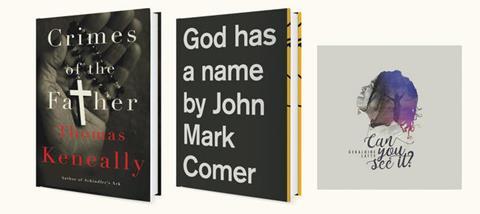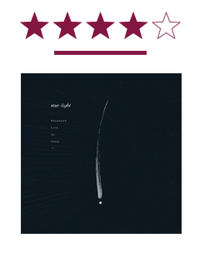
Crimes Of The Father
Thomas Keneally
Sceptre
In his most famous novel, Schindler’s Ark (adapted into the multi-award-winning film Schindler’s List), Thomas Keneally tells the story of one man doing what he could in the face of a terrible atrocity. In Crimes of the Father he takes a similar tack. The protagonist, Father Frank Docherty, is both a priest in the Catholic Church and an associate professor of developmental psychology in a Canadian university. Docherty is Australian by birth, and the story covers a visit home to Sydney where he is to give a lecture on the relationship between celibacy and child abuse in the priesthood. His academic knowledge of the subject and his somewhat prophetic purpose are given a clear grounding in practicality when he encounters three adult victims of child abuse. Coincidentally, the priest who abused them is the brother of one of Docherty’s friends.
The narrative hops back and forth in time as the different characters’ stories unfold, and the sheer number of people and plotlines is occasionally confusing. One skill of great writers is to get inside the heads of people they fundamentally disagree with and present them as rounded, perhaps even sympathetic, characters. The moments when Keneally is able to do this are fleeting, but give the book a much-needed richness and depth. Other than Docherty, none of the characters seemed fully formed. For a story about something so shocking and terrible, it oddly lacks bite, and its resolution is unsatisfyingly quick and easy.
Readers should note that this book was written for the mainstream market and contains infrequent very strong language, and descriptions of sexual encounters which may be too graphic for some. JP
Jesus Among Secular Gods
Ravi Zacharias & Vince Vitale
FaithWords
This new book from Christian apologists Ravi Zacharias and Vince Vitale explores the ‘secular gods’ of atheism, scientism and humanism. The two philosophers point out the flaws of these and other ‘isms’ and present the Christian faith as a better alternative.
At times Jesus Among Secular Gods felt like two different books. Vitale’s chapters contained a helpful mixture of personal story and academic rigour. His work is full of compassion and understanding, making his chapters easy to read and relate to. It is a rare delight to see an apologist take complicated head issues and apply them so adeptly to the heart. Zacharias, on the other hand, often assumes too much knowledge of the reader and uses complicated philosophical language and concepts.
The book may help Christians who want a greater understanding of other worldviews. It may also be a good book for engaged, academic and philosophically astute non-Christians. But it won’t help most seekers – largely because (as with many Christian books critiquing secular perspectives) Zacharias’ tone often comes across as condescending and it necessitates an academic background. JJ
God Has a Name
John Mark Comer
Zondervan
It’s easy to see why Portland-based pastor John Mark Comer has been dubbed “the orthodox Rob Bell”. The two figures share an incredible gift of communication.
Like Bell, Comer’s writing style is immensely readable; punchy sentences, intriguing analogies and thought-provoking questions mean the reader flies through the pages. Like the best teachers, this 36-yearold pastor makes the learning process enjoyable.
Comer’s previous books have dealt with work (Garden City), sex (Loveology) and depression (My Name is Hope). Now the pastor is taking on the biggest subject of all: God.
God Has a Name is effectively an exegesis of Exodus 34:4-7 which Comer claims is “the most quoted verse in the Bible, by the Bible”. The passage sees God reveal his name as Yahweh and his nature as compassionate, loving and faithful.
The Exodus passage includes the words “[God] punishes the children and their children for the sin of the parents to the third and fourth generation”. Comer tackles this difficult passage head-on. He never apologises for the Bible, but he does reveal its context.
This is an extremely helpful, well-argued and theologically sound book that will particularly appeal to young adults and millenials. SH
Who Needs The Old Testament?
Katharine Dell
SPCK
Katharine Dell is cross. She is also courageous. She is cross with Christopher Hitchens and Richard Dawkins and their fellow New Atheists for their treatment of the Old Testament.
The author tackles Dawkins and Hitchens head-on in rigorous scholarly fashion. The reader can almost feel the pages shudder with impact.
Dell is unafraid to look at some of the most difficult passages in the Old Testament. Understanding context, culture and the holiness of relationship with God are tools to understand the Old Testament, she says. But she unsettles when describing some of the Old Testament narrative, like the Tower of Babel, as myth – “not to be taken literally”. It begs the question – what is real in the Old Testament and what is myth? How can we discern the difference?
While Katharine’s battle with the New Atheists is admirable, it can also appear personal and tiresome. After reading this book, however, you will probably have a fresh appetite to read the Old Testament and appreciate its value. MLS
Whole Life Worship
Sam & Sara Hargreaves
IVP
This challenging book provides the reader with a wake-up call. But Whole Life Worship doesn’t just get under your skin, it provides practical and useful ways of growing in worship both inwardly, and outwardly in the wider community.
The authors believe a cultural shift needs to take place away from the classic ‘Sunday thinking’ towards a new rounded way of worshipping God.
God is in the detail. Be it caring for your neighbour who’s elderly and frail or remembering the name of the assistant in your local supermarket – it’s all worship.
Sam and Sara Hargreaves challenge the Church to reflect this whole life discipleship in our sung worship. They offer practical advice and tips on how to do this. The challenge is to get the Church to the point where it doesn’t need a manual and worship becomes an organic way of life. In the meantime, this book is a fantastic source of practical and divine inspiration. NB
Can You See It?
Geraldine Latty
LuceMusic London
It’s refreshing to see a worship album given creative arrangements. Predominantly piano-based jazz, but also fusing elements of classical, gospel and Latin, framed within a straight CCM vibe, this inventive and technically excellent release from Geraldine Latty has created a space all of its own.
Lyrically, it is as cliché-free as the music, and shines with honesty and hope. Each song covers various aspects of God: outside of time and space, Trinity, creator, liberator, the one present in our struggles and one who cares about the everyday.
Latty and producer/husband Carey Luce both lecture in music, and the high production values reflect this (although one or two ideas, such as the Latin callouts and first half of ‘Remind me’ are too selfconscious).
‘Spirit of God’ is an essential listen, with its gorgeously interweaving vocal lines over languid rhythms. Not far behind are ‘Beyond wonder’, an up-to-date psalm, and the album closer ‘Evensong’, which is a beautiful prayer to end the day. DW
The book that changed my life
The Christian Theology Reader
Alister McGrath
Nowadays I’m a jester – but even jesters gotta learn. Before drama school, I studied theology at the University of Nottingham.
The academic side of Christianity is a pretty forbidding place. Then I was recommended Alister McGrath’s fantastic compendium: The Christian Theology Reader. Its size is pretty forbidding too, but it’s an exciting race through the history of theology. It achieves the impossible: laying out complex ideas in bite-size accessible chunks, and giving a sense of how theological understanding has developed over the years.
It was the first book to lift the lid on theology as a concept, theology as a degree subject, and to show that you can develop new thought on God and the Bible without being heretical or dismissive of the whole faith thing.
It helped me know my Aquinas from my Augustine, my Luther from my Calvin. Professor McGrath’s introductions to each carefully selected passage shine a light on where in history (and theology) we are. If you can’t spare three years, read this – all it’s missing is a Print-Your-Own Theology Diploma on the last page. By Paul Kerensa
Starlight
Bethel Music
Integrity
We often sing about getting back to “the heart of worship”. This is an album which will help you do exactly that. Starlight is full of declarations about who Jesus is and what he means to us. Although the album sometimes addresses our feelings, it does so in a beautiful, powerful and poetic manner, avoiding self-centredness.
Spontaneous tracks on live albums can sometimes be cringey and fall into a ‘you had to be there to appreciate it’ category, but I was so moved that I admit to having to wipe away the tears a few times.
The album opens with a delicate twinkly sound. This is followed up by a modern, rounded ephemeral atmosphere which carries the whole album. The vocals are mostly female, with enigmatic timbres.
Standout tracks include ‘Starlight’, ‘There’s no other name’, ‘Extravagant’ and ‘King of my heart’. A couple of songs are a little weaker, such as ‘The war is over’. But most are growers, making this an excellent album. KW
REVIEWERS: JENNIE POLLOCK is a freelance writer and editor who lives in London and works wherever there’s an internet connection and a good cup of tea • JESSE JACK is a youth worker in Middlesex and an amateur apologist • SAM HAILES is the deputy editor of Premier Christianity magazine • MARK LANDRETH-SMITH together with his wife Beverley lead Bridge Church Newbury – a Commission church, part of the Newfrontiers family • NICK BATTLE is an author, musician and broadcaster • DEREK WALKER is an Anglican lay minister, kitchen designer and writer • KARLA WILLOWS is on Kings Church Eastbourne’s creative team and is also a youth leader •



































